Curriculum with purpose
Every undergraduate student at Georgia College & State University engages in curriculum called – Core IMPACTS – that provides a solid foundation for life, learning, and careers and helps students build momentum to fulfill their academic, personal, and professional aspirations.
And because Georgia College offers a liberal arts experience rooted in critical thinking and analytical reasoning, our students gain real-world skills through hands-on learning during their time in the classroom. Throughout all of our curriculum, we embrace many of the career-ready competencies employers are looking for.
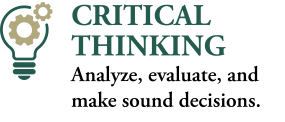

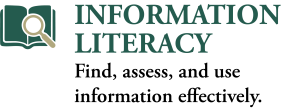
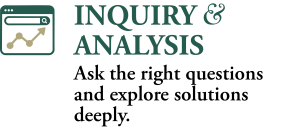
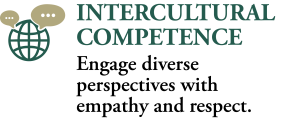
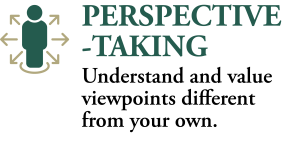

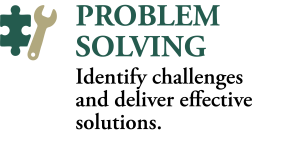

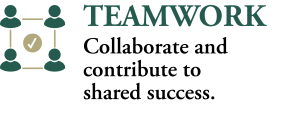
The University System of Georgia's Core IMPACTS introduces different ways of knowing the world and connects students to the big questions that drive their future and provide the essential skills needed to succeed.
| How is Core IMPACTS structured? | |
|---|---|
| I | Institutional Priority |
| M | Mathematics and Quantitative Skills |
| P | Political Science and U.S. History |
| A | Arts, Humanities, and Ethics |
| C | Communication in Writing |
| T | Technology, Mathematics, and Sciences |
| S | Social Sciences |
Exploring IMPACTS
Core IMPACTS provides students with more than just a broad experience with different ways of knowing the world. It builds the foundations for critical skills necessary for graduates to thrive in the workplace and beyond. In all, our students take 42 credit hours (or about 13 – 14 classes) with flexibility in course choices based on your interests, course of study, and program recommendations.
I - Institutional Priority
Orienting Question
How does my institution help me to navigate the world?
USG Learning Outcome
Students will demonstrate the ability to think critically and solve problems related to academic priorities at their institution.
GCSU Learning Outcome
Students will be able to explain multiple intellectual approaches that clarify or respond to problems, topics, themes, and/or issues.
Career-Ready Competencies
- Critical Thinking
- Teamwork
- Time Management
M - Mathematics and Quantitative Skills
Orienting Question
How do I measure the world?
USG Learning Outcome
Students will apply mathematical and computational knowledge to interpret, evaluate, and communicate quantitative information using verbal, numerical, graphical, or symbolic forms.
GCSU Learning Outcome
Students will be able to interpret mathematical information and concepts in verbal, numeric, graphical, and symbolic form.
Career-Ready Competencies
- Information Literacy
- Inquiry and Analysis
- Problem-Solving
P - Political Science and U.S. History
Orienting Question
How do I prepare for my responsibilities as an engaged citizen?
USG Learning Outcome
Students will demonstrate knowledge of the history of the United States, the history of Georgia, and the provisions and principles of the United States Constitution and the Constitution of Georgia.
Career-Ready Competencies
- Critical Thinking
- Intercultural Competence
- Persuasion
A - Arts, Humanities & Ethics
Orienting Question
How do I interpret the human experience through creative, linguistic, and philosophical works?
USG Learning Outcome
Students will effectively analyze and interpret the meaning, cultural significance, and ethical implications of literary/philosophical texts or of works in the visual/performing arts.
Career-Ready Competencies
- Ethical Reasoning
- Information Literacy
- Intercultural Competence
C - Communicating in Writing
Orienting Question
How do I write effectively in different contexts?
usg Learning Outcomes
- Students will communicate effectively in writing, demonstrating clear organization and structure, using appropriate grammar and writing conventions.
- Students will appropriately acknowledge the use of materials from original sources.
- Students will adapt their written communications to purpose and audience.
- Students will analyze and draw informed inferences from written texts.
GCSU Learning Outcome
Students will be able to communicate clearly in written English that meets conventional standards of correctness.
Career-Ready Competencies
- Critical Thinking
- Information Literacy
- Persuasion
T - Technology, Mathematics & Sciences
Orienting Question
How do I ask scientific questions or use data, mathematics, or technology to understand the universe?
USG Learning Outcome
Students will use the scientific method and laboratory procedures or mathematical and computational methods to analyze data, solve problems, and explain natural phenomena.
GCSU Learning Outcome
- Students will be able to use technology to facilitate problem-solving.
- Students will be able to use critical observation and analysis to model and/or predict natural phenomena.
- Students will be able to evaluate mathematical and/or quantitatively-based arguments.
Career-Ready Competencies
- Inquiry and Analysis
- Problem-Solving
- Teamwork
S - Social Sciences
Orienting Question
How do I understand human experiences and connections?
USG Learning Outcomes
Students will effectively analyze the complexity of human behavior, and how historical, economic, political, social, or geographic relationships develop, persist, or change.
Career-Ready Competencies
- Intercultural Competence
- Perspective-Taking
- Persuasion
How is Georgia College preparing undergraduates for careers?
Georgia College provides a compelling Core IMPACTS experience for undergraduate students through our award winning GC Journeys program.
By participating in five inside and outside the classroom transformative experiences during your time at Georgia College, you will step outside of your usual surroundings, gain authentic experiences, solve problems, become a leader, participate in real-world settings and put ideas into action.
